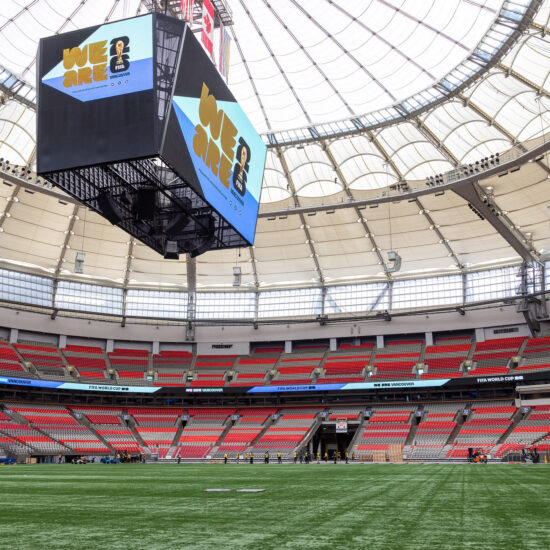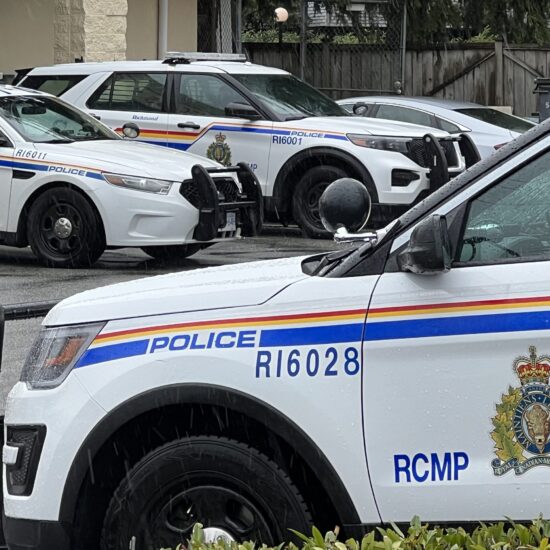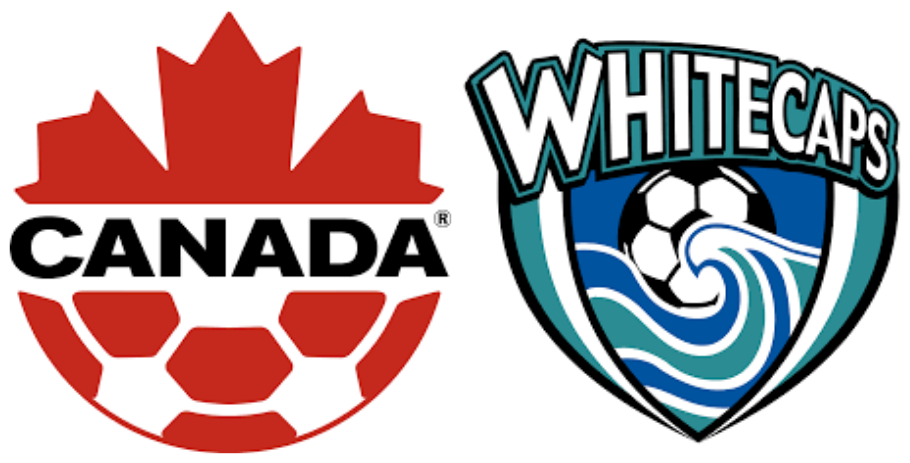
Bob Mackin
The year 2019 was supposed to be all about celebrating the past and welcoming the future for the Vancouver Whitecaps.
It was the 40th anniversary of the North American Soccer League team’s Soccer Bowl ’79 championship. Today’s Whitecaps, originally launched as the 86ers in 1987, hoped to use nostalgia to launch the era of new coach Marc dos Santos.
Instead, it was the worst season on and off field for the 2011 Major League Soccer entrant.
It hit a low when the local boy made good in the NASL, Bob Lenarduzzi, was demoted from president to club liaison, a sort of consultant and goodwill ambassador, in August. That was six months after we learned from a whistleblower that, under Lenarduzzi’s presidency in 2007 and 2008, the women’s team was suffering a toxic culture.
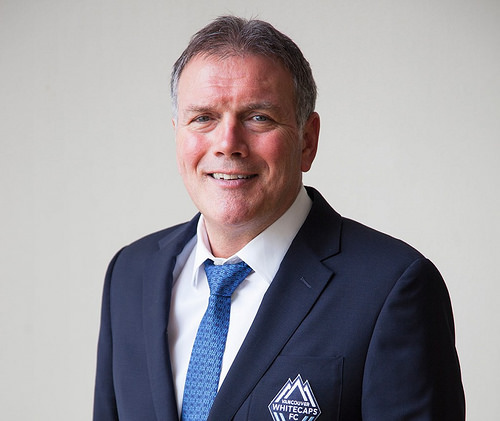
Bob Lenarduzzi (Whitecaps)
The Whitecaps were slow to address Ciara McCormack’s concerns. The Southsiders and other supporters groups protested by walking out to the concourse before halftime. Many fans just didn’t walk into B.C. Place Stadium at all. After several public relations blunders, the club finally hired a Toronto consultancy in late May to review what happened in 2008 and years since.
Oddly, the clock did not begin in 2007, the year that McCormack originally brought her concerns to Lenarduzzi.
More than three months late, on the last Wednesday before Christmas, the report was published.
What’s it called?
Review of Safe Sport and HR Practices: Findings and Recommendations Report. It was commissioned by the Whitecaps, who have not disclosed how much it cost.
Who wrote the report?
Three people from Toronto-based Sport Law and Strategy Group (SLSG), who received “guidance and peer review” from the company’s partners, Dina Bell-Laroche and Steven Indig.
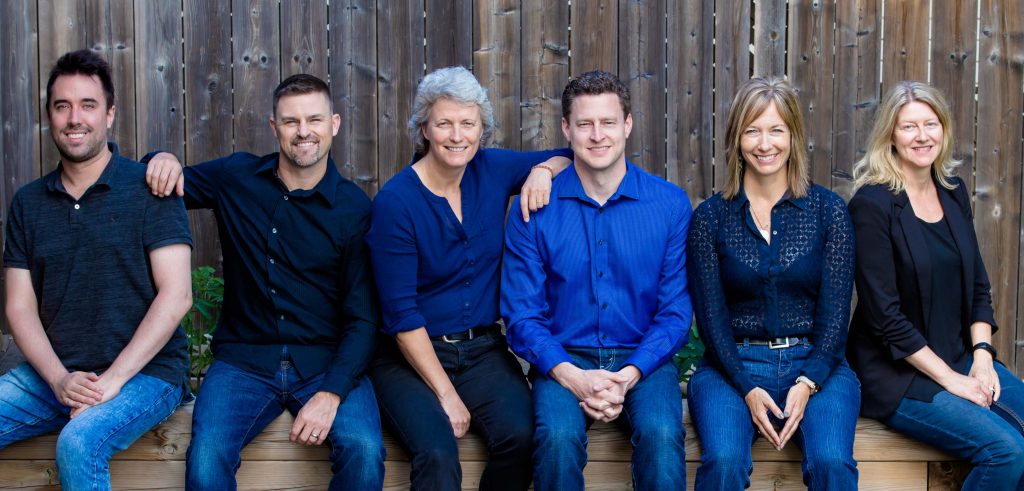
Sport Law and Strategy Group
Lawyer Bell-Laroche is a former Canadian Olympic Committee press chief and Indig the legal counsel for Ontario Soccer Association.
SLSG is a 1992-founded consultancy that specializes in organizational governance, business planning and management, dispute resolution, marketing and legal issues.
The trio
Ex-criminal defence lawyer LeeAnn Cupidio, social media, research and communication specialist Kevin Lawrie and administrator Kathy Hare.
Lawrie also co-authored a 2011 evaluation of Own the Podium, the Canadian Olympic Committee-aligned high-performance sports agency that was chaired by Whitecaps’ executive chair John Furlong.
How long is the report?
The report is a 32-page summary, hence the “Findings and Recommendations Report” subtitle. Based on the amount of interviews, there would be reams of unreleased transcripts or interview notes and supporting documents in the possession of SLSG and the Whitecaps.
Extra time
When it was announced May 27, the Whitecaps said “the work is expected to take approximately three months.”
It took another three months, and then some.
The Whitecaps say they received the final report Dec. 13. The club explained the priority was to give SLSG “the necessary time to conduct their work thoroughly and independently.”
What else was up?
The report was released two days after the signing of Canadian international striker Lucas Cavallini. The designated player is integral to the club’s pre-Christmas ticket sales and merchandise campaign.
’Twas the week before…
The timing, on the last Wednesday before Christmas, also suggests the club received advice from a person with government and political damage control.
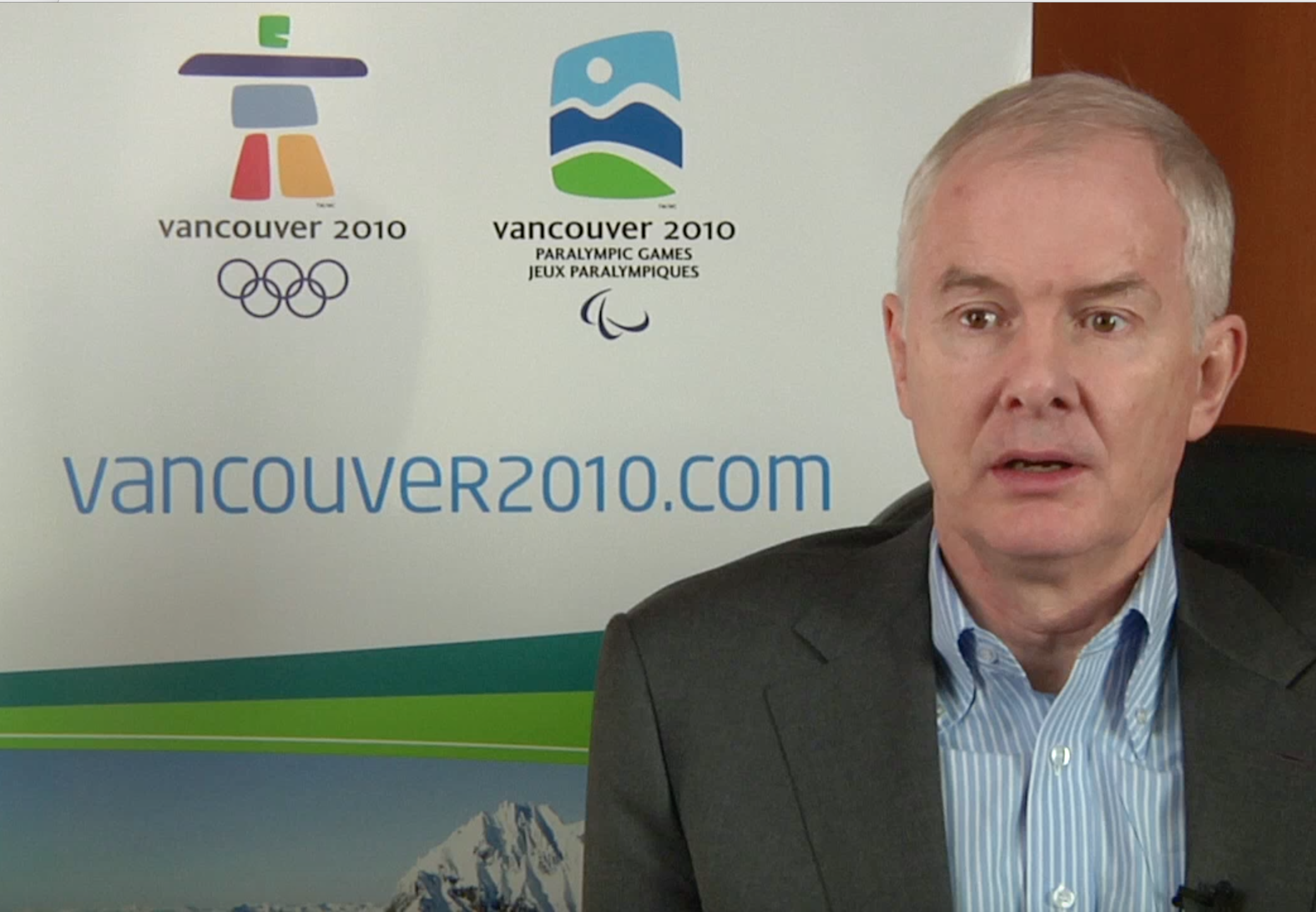
John Furlong (VANOC)
In May, theBreaker.news was told by two reliable sources that longtime public relations executive Renee Smith-Valade, Furlong’s spouse, was offering advice to the club. Smith-Valade was head of communications at the Vancouver 2010 Winter Olympics and Paralympics organizing committee. She is now vice-president of inflight service with Air Canada.
In 2012, six months after he joined the Whitecaps, Furlong was the subject of an exposé by Laura Robinson in the Georgia Straight. Robinson found inconsistencies in Furlong’s post-Olympic memoir and several former students in his physical education classes in Northern British Columbia alleged he abused them. Furlong denied the allegations. RCMP did not pursue charges and a civil lawsuit by never made it to trial.
Who blew the whistle?
Former Whitecaps’ women’s team player McCormack kicked-off the whole process with her explosive blog post last Feb. 25, under the headline: A Horrific Canadian Soccer Story – The Story No One Wants to Listen To, But Everyone Needs to Hear. The villain was “Coach Billy” and included documents dating back to 2007 to back-up her claims. “Coach Billy” had returned to coaching young women, despite an agreement that he would not do so.
What did she have to say?
McCormack was not impressed with the Dec. 18-published report, but she had low expectations.
“The primary purpose was from a PR standpoint to have the whole thing framed in a way that didn’t make them look like they didn’t cover anything up,” McCormack said in an interview. “The fact they used that specific verbiage.
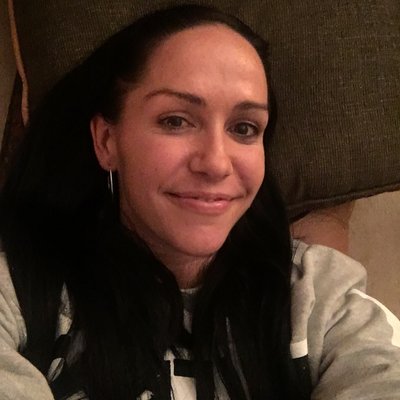
Ciara McCormack (Twitter)
“Part of me was hopeful, but actions speak louder than words. Over and over again the Whitecaps have shown they’re about themselves and their image, it’s just corporate-speak and there’s nothing of real character and integrity.”
McCormack said the Canadian Soccer Association cannot escape accountability. She wished that the report had been conducted by a truly independent third-party, rather than one bought and paid for by the Whitecaps. She also wished it was not released at a time of year when media attention and public discourse will be limited.
“Even the fact this story is dropping a few days before Christmas, people are a lot smarter now, everybody sees through the little tricks.”
In three parts
SLSG said it sought to do three things: understand the steps the Whitecaps took to address past incidents, understand current stakeholder experiences via three separate surveys, and compared current Whitecaps’ documents and processes to leading safe sport and human resources practices.
Survey says… what?
SLSG conducted three surveys of Whitecaps coaches and staff, parents and guardians, and participants to compare current Whitecaps documents and procedures. A total 1,411 survey forms were sent, but only 326 completed. The report said the response rate was 37.3% overall, but our math says it was 23.1%.
Of the seven Whitecaps administrators, three did not complete the survey. Their names and titles were not mentioned.
The survey questions were not included in the report.
No names mentioned
Citing privacy legislation, SLSG was not provided with contact information to distribute the survey or solicit interviews.
“Contact information was provided for staff and administrators who participated in the interviews about the Whitecap’s HR practices.”
At the outset, the Whitecaps, on behalf of SLSG, invited anyone with relevant information to come forward confidentially to SLSG.
How many key interviewees?
Interviewees included 14 players from the 2006-2008 Whitecaps women’s roster; seven past and present Whitecaps administrators and staff; six past and present Whitecaps coaches; six other interested parties, including parents/guardians and past and present supporters.

Bob Birarda in 2005 (CSA)
Who was the coach, eh?
The report refers to “Coach A.” But it does not name the coach at the centre of the controversy. That was Bob Birarda. theBreaker.news chose to name Birarda back in February because it related directly to the public announcement and media coverage in October 2008 of his departure as coach.
It must be emphasized that there are no criminal charges or civil actions at this time and none of the allegations has been tested in a court of law. Birarda has not responded to requests for comment. Birarda was suspended by Coastal FC in South Surrey early this year as a result of the publicity.
No help from the 2008 investigator
Earlier this year, theBreaker.news spoke with lawyer Anne Chopra, who was the investigator hired by the Whitecaps in 2008. SLSG, however, reported that it was unable to reach her.
 “Since the beginning of the process, the SLSG intended to interview the lawyer and workplace consultant (hereinafter referred to as the Investigator) who was retained by the Whitecaps’ in 2008 to conduct investigations, provide advice and recommendations, and act as ombudsperson for the organization,” the report said. “Multiple attempts were made to contact the Investigator at two email addresses and a current active phone number provided by the Whitecaps and at multiple phone numbers found online. Ultimately the SLSG was unable to connect with the Investigator.”
“Since the beginning of the process, the SLSG intended to interview the lawyer and workplace consultant (hereinafter referred to as the Investigator) who was retained by the Whitecaps’ in 2008 to conduct investigations, provide advice and recommendations, and act as ombudsperson for the organization,” the report said. “Multiple attempts were made to contact the Investigator at two email addresses and a current active phone number provided by the Whitecaps and at multiple phone numbers found online. Ultimately the SLSG was unable to connect with the Investigator.”
No help from the original 2008 whistleblower
“The SLSG also intended to interview the player who brought forward the initial concerns to the Whitecap’s women’s team manager, Diana Voice, in May 2008, however this player declined to participate.”
Who was interviewed?
Fourteen of 82 former players contacted were interviewed by SLSG. The players were not identified.
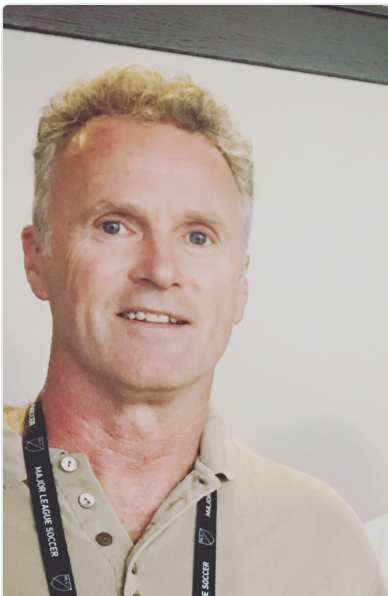
Whitecaps’ owner Greg Kerfoot (Santa Ono, Twitter)
SLSG also interviewed nine individuals in the organization, including owner Greg Kerfoot, Bob Lenarduzzi, soccer development director Dan Lenarduzzi, COO Rachel Lewis and soccer operations vice-president Greg Anderson. Plus Voice and three coaches who requested anonymity.
Documents
SLSG reviewed almost 20 documents, including seven Whitecaps internal handbooks, guides and policies, and similar documents from Canada, B.C. and Ontario soccer associations, Canadian Centre for Ethics in Sport and U.S. Center for Safe Sport. Some of the non-Whitecaps documents are linked in the report.
Small-caps
SLSG called the 2008 version of the Whitecaps “much smaller and less sophisticated organization” than in 2019. The women’s team had a four-month W-League season and the head coach doubled as the under-20 national team coach. Several players were on both squads.
What happened?
SLSG: “In May 2008, the Whitecaps were alerted that a player had received inappropriate text messages from her coach. The matter was investigated and corrective actions were taken. In September 2008, while the same coach was working with the U20 national team, the Canadian Soccer Association received a similar complaint regarding the coach’s behaviour in that program. Another investigation was conducted which resulted in the termination of the coach from both programs.”
No “cover up”
According to SLSG, Whitecaps were not attempting to “sweep [the incidents] under the rug.”
“The leadership team seemed to genuinely believe they were receiving proper legal and administrative advice — which they followed.”
Media misled
The report is silent on the Oct. 9, 2008 news release that announced Birarda’s mutually agreed departure from the club. There was nothing in that news release to suggest misconduct on Birarda’s part. Neither the club nor Birarda indicated any reason for the departure when contacted by a reporter at the time.
Sexts
The club ordered Birarda to undergo sensitivity training when the first complaint of inappropriate text messages with a player emerged. It was a summer when he was also an assistant coach on the Beijing 2008 Olympics team and Whitecaps’ owner Greg Kerfoot was a financial booster of the national team program.
Turned a blind eye
SLSG: “The Whitecaps shared their findings and the actions that were taken with the CSA, however it does not appear that any monitoring was put into place to ensure the corrective measures were being adhered to,” SLSG reported.
“After a second, similar complaint about the same coach was raised with the CSA in September 2008, the Whitecaps worked in collaboration with the CSA to determine next steps. Both organizations followed the direction and guidance of the same investigator which resulted in the organizations terminating the coach from both programs.”
Dropped the ball
SLSG said there was a lack of effective communication with players before, during and after the investigations and the leadership team chose a path of confidentiality.
“However, it is clear from the information provided by the players that it was this lack of communication that resulted in frustration, mistrust and speculation which has contributed to the lingering animosity still held by some former players today.”
Passed the ball
SLSG: “The Whitecaps were criticized by some players for not taking steps to ensure that the coach was prohibited from coaching in the future. It was determined that the Whitecaps did not have the authority and jurisdiction to prohibit anyone from coaching in other soccer programs.”
Bullying on the boys team
The first of two other incidents included in the report. Global News reported in 2017 about criminal charges for players on the under-15 boys residency program after a teammate had been sexually assaulted in a dressing room.
“These players were minors at the time of the incident, so the specific details of the assault are not included in this report,” says the SLSG footnote.
The mother of the victim claimed the Whitecaps tried to “downplay the situation and convince the family not to go to the police. She claimed that they did not take the matter seriously and tried to convince the family to deal with the matter internally. At the time, the Whitecaps did not respond to any media requests for comment because the matter was under police investigation.”
Two-day delay
There was a 48-hour delay in contacting police in 2017. SLSG reported that staff tried to ensure the family knew “conflicting facts, potential risks, and options available to them.” It said the staff did not mean to dissuade the family from notifying police.
Importantly, SLSG conceded that it only collected information about the incident from the Whitecaps; the mother was not interviewed because the incident fell outside the initial scope of the review.
“Nevertheless, Whitecaps staff should not have attempted to act as counsel to the family and, if it was suspected that there may have been a criminal incident, should have contacted police immediately themselves.”
Mis-hire
Whitecaps announced in October 2013 that they lured Brett Adams, a coach from England to run the Kootenay Academy Centre. Adams had been interviewed in January 2013 when no position had been open, so his information was kept on file. “His references and background check were verified,” the report said.
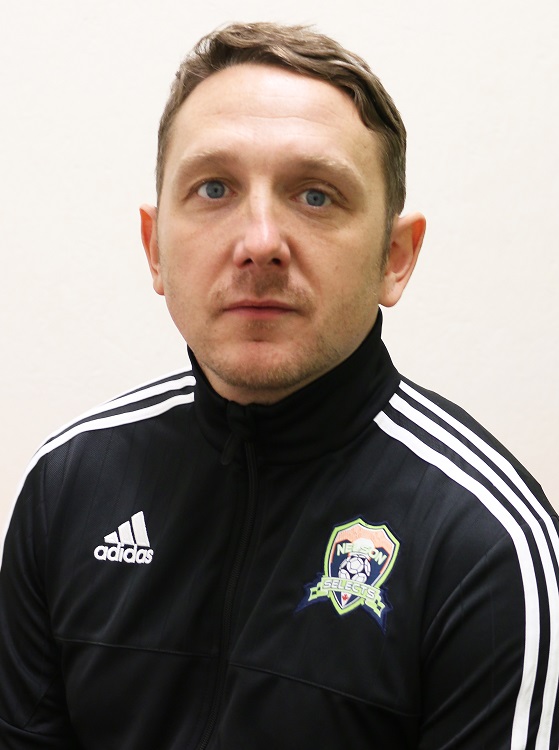
Brett Adams (Nelson Soccer)
“The Whitecaps were unaware of the racism allegations (which occurred in April 2013, after the initial screening) and did not perform any additional screening before the coach was hired. It was later, in 2015, that the coach was sanctioned by the FA (a governing organization in English soccer). “
“Based on the information provided and interviews with staff, the Whitecaps acknowledged that there was an error in the hiring process for this coach. Had the Whitecaps redone the interview and vetting process once the coaching position became available, these allegations may have impacted the hiring decision.”
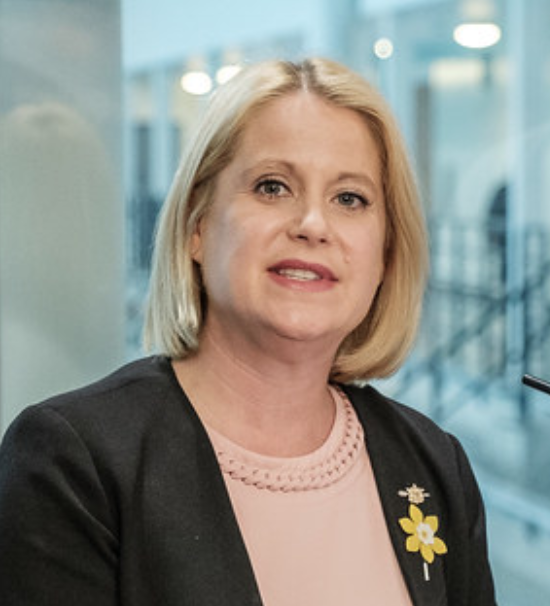
Tourism Minister Lisa Beare (BC Gov)
Recommendations
The report contains 40 recommendations on safe sport and 10 on human resources.
What does the government say?
Statement to theBreaker.news from Tourism Minister Lisa Beare, whose portfolio includes sport and B.C. Pavilion Corporation, manager of B.C. Place Stadium:
“Any physical, sexual or psychological harassment and abuse of athletes is completely unacceptable. Athletes have the right to play free of abuse, discrimination and harassment. The Whitecaps are an independent professional sport organization, accountable to their leadership and their fans as stakeholders. It is incumbent on all sports organizations to ensure players are protected and any incident of player abuse should be reported to the appropriate authorities for investigation.”
What next?
SLSG says the Whitecaps policies and procedures evolved since 2008. The Whitecaps say: “We will be working as expeditiously as possible to implement the recommendations effectively.”
Police file
This may not be over.
The Whitecaps said in April that they contacted the Vancouver Police Department, after more players came forward with allegations. In August, the VPD referred theBreaker.news to the North Vancouver RCMP.
theBreaker.news also independently verified that a file is open and an investigation underway.
Support theBreaker.news for as low as $2 a month on Patreon. Find out how. Click here.










